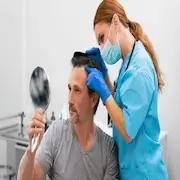Best Vitamins After Hair Transplant
Best Vitamins After Hair Transplant, follow the hair transplant post-op instructions religiously and never miss a dose of aftercare medication. Supplements, nutrition intake, and medications have a huge role to play in minimizing the side effects and complications of the surgery.
Without a doubt, hair transplant surgery requires an individual to spend a fortune. Hence, a patient has to do all that is necessary to kickstart the growth of transplanted hair. With a balanced diet and vitamin intake, the chances of achieving desired results will considerably increase.

The Importance of Vitamins After Hair Transplant Surgery
Nutrients, vitamins, and minerals play a key role in regulating multiple bodily functions. Not all vitamins are produced by our bodies, hence, need to be taken externally or derived from food. Dietary intake of vitamins is essential for the success of the hsurgery.
After surgery, the body requires a significant amount of vitamins and minerals to go through different stages of recovery. Consult with the physician for a detailed diet plan and the best vitamins to take post-surgery for desired results. Usually, hair transplant surgeons recommend taking the following vitamins
Best Vitamins After Hair Transplant
Vitamin C – Besides improving skin tone, this powerful antioxidant has a significant impact on hair health. Vitamin C aids in reducing hair loss and promoting the growth of new hair. Moreover, it is also renowned for stimulating the production of collagen and improving cell health.
Additionally, vitamin C facilitates iron absorption and offers optimal protection from oxidative stress. It will considerably shorten the recovery phase and stimulate the growth of transplanted hair.
Following hair restoration surgery, a patient can take supplements or eat foods rich in Vitamin C such as citrus, melons, strawberries, and others.
Vitamin E – Not many people know but vitamin E is a natural hair conditioner. It contributes to scalp health, reduces dryness and breakage, and makes the hair shinier. The natural antioxidant effects of vitamin E reduce oxidative stress, fight free radicals, and promote healthy hair follicles.
In addition, several studies indicate that adding vitamin E supplements to the daily routine has several benefits such as:
Besides supplements, Kiwi, almonds, spinach, avocados, papaya, salmon, and tuna are great sources of vitamin E.
Vitamin A
Vitamin A – Unquestionably, vitamin A supplementation can do wonders for your hair. After surgery, vitamin A will contribute to the growth of cells and tissues. Additionally, it stimulates sebum production to prevent the scalp from drying out.
Plus, this vitamin makes the hair grow thicker and healthier as well as reduce frizz and dryness. Intake of a balanced amount is necessary to get all the benefits of vitamin A. On the flip side, vitamin A excess may lead to hair shedding.
Dietary sources of vitamin A include dairy products, carrots, sweet potatoes, fish oil, tomatoes, and mangoes.
B-Vitamins
Vitamin B complex has eight vitamins vital for improving overall health. B7 and B12 vitamins enhance the growth and development of hair. People deficient in vitamin B7 or otherwise known as vitamin H can experience hair loss. B2, B3, B7, Folate, and B12 stimulate hair growth.
Daily intake of the aforesaid supplements will
Egg yolks, peanuts, almonds, whole grains, avocado, fish, and leafy greens are great sources of B vitamins.
Vitamin D
Last but not least, vitamin D deficiency stunt the growth of new hair. Many studies indicate the link between alopecia and vitamin D deficiency. Hence, getting a sufficient amount of vitamin D after hair transplant surgery promotes regrowth and the creation of new hair follicles.
Sun exposure, vitamin D supplements, and eating foods rich in vitamin D will aid in the creation of new hair follicles, reverse hair loss, and promote hair growth.
Should you Take Vitamins After Hair Transplant Surgery?
Yes, some physicians prescribe B vitamins supplements to accelerate the growth of transplanted hair. If you do not want to take vitamins right after the surgery, eat diverse food to receive the whole spectrum of vitamins required to stimulate the growth of new hair.
Balanced nutritional intake before and after the hair transplant surgery is essential for faster healing and achieving the best results. Take vitamin supplements to cure deficiencies and improve hair health. Consult with your hair surgeon to create a dietary program rich in protein and vitamins for quick healing and hair growth.


